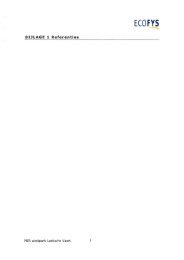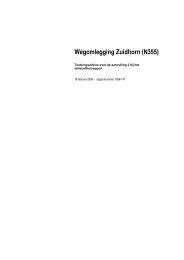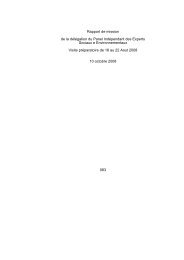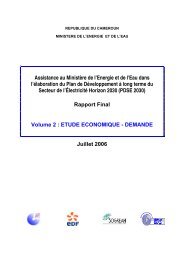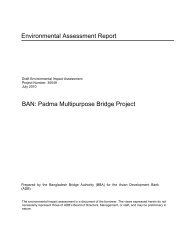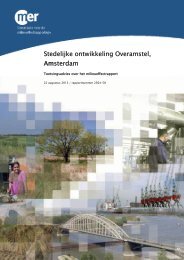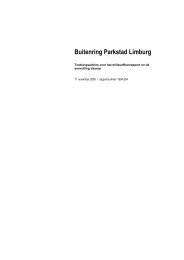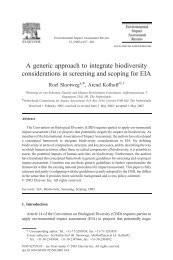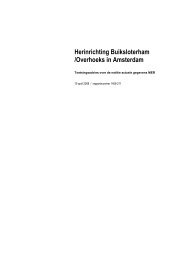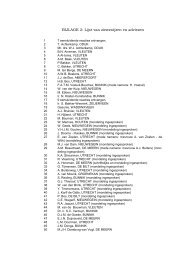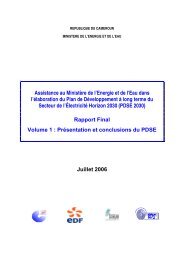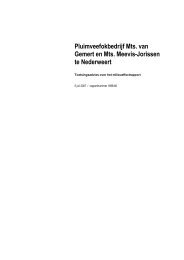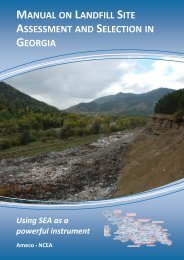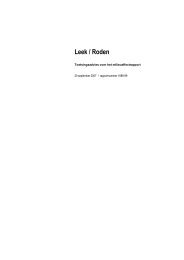Scoping Advice for the Dutch IWRM Support Programme Rwanda
Scoping Advice for the Dutch IWRM Support Programme Rwanda
Scoping Advice for the Dutch IWRM Support Programme Rwanda
Create successful ePaper yourself
Turn your PDF publications into a flip-book with our unique Google optimized e-Paper software.
- Pilot approach in which a catchment planning process starts in one or a limited number ofcatchments. The notion here is that a catchment planning methodology has to be developedon a learning by doing basis. Once defined <strong>the</strong> approach can be upscaled to <strong>the</strong> entirecountry.Assessment criteria are: appropriateness of methodology; quality of catchment plans; availabilityof staff; capacity of staff; time span in which catchment plans can be available <strong>for</strong> all catchments;urgency of issues, funding requirements, logistical feasibility.Catchment selection criteria. When a limited number of catchments will be selected, it must beclear on what criteria this selection is based. The SEA is asked to define a set of criteria in closecollaboration with EKN and RWRD, and assess <strong>the</strong> choice of catchments based on <strong>the</strong>se criteria.Criteria can be based on, but are not limited to, urgency of issues. Suggestions <strong>for</strong> criteria havebeen made in section 3.3 (page 20).6. Assessment, decision making and management of <strong>the</strong> SEASince <strong>the</strong> SEA will in<strong>for</strong>m <strong>the</strong> planning and decision making of EKN on <strong>the</strong> implementation of itssupport programme, <strong>the</strong> SEA process is owned and managed by EKN.For <strong>the</strong> programme itself this lies somewhat different as <strong>the</strong> programme intends to support <strong>the</strong>implementation of <strong>IWRM</strong> in <strong>Rwanda</strong>, a <strong>for</strong>mal task of RWRD. Ownership of <strong>the</strong> plan consequentlyis a shared responsibility of both EKN and RWRD; how this translates into decision making on <strong>the</strong>programme remains to be defined by <strong>the</strong> two parties.It is expected that most of <strong>the</strong> SEA coordination and implementation will be done by <strong>the</strong> newlyappointed Thematic Expert at EKN, when needed supported by <strong>the</strong> NCEA secretariat or <strong>the</strong>irexperts. During <strong>the</strong> <strong>for</strong>mulation missions <strong>for</strong> <strong>the</strong> EKN’s support programme, fur<strong>the</strong>r SEA expertisecan be mobilized as well. The NCEA proposes <strong>the</strong> following roles in this planning and SEA process:Proposed Management set up <strong>for</strong> <strong>the</strong> SEA <strong>for</strong> <strong>the</strong> EKN’s support programmePlan owner EKN EKN programme operates in support ofRWRDSEA owner EKN Voluntary SEA (<strong>Rwanda</strong> requires SEA <strong>for</strong>loans <strong>for</strong> development projects 39 ).SEA Oversight NCEA & REMA Tbd: independent review or coaching (whichever EKN prefers).SEA Funding EKNSEA Time frame 1: March – October 20132: 2013 -2017Formulation phaseImplementation phaseWith respect to <strong>the</strong> role of NCEA it needs to be determined whe<strong>the</strong>r <strong>the</strong> NCEA will have <strong>the</strong> <strong>for</strong>malrole of independent reviewer, or will moreover act as a process coach. Given <strong>the</strong> little experiencewith <strong>the</strong> SEA process in <strong>Rwanda</strong> <strong>the</strong> role of NCEA as a coach is most probable. Coaching can also39 General Guidelines and Procedures <strong>for</strong> SEA, section 3.2.5, p.1531



